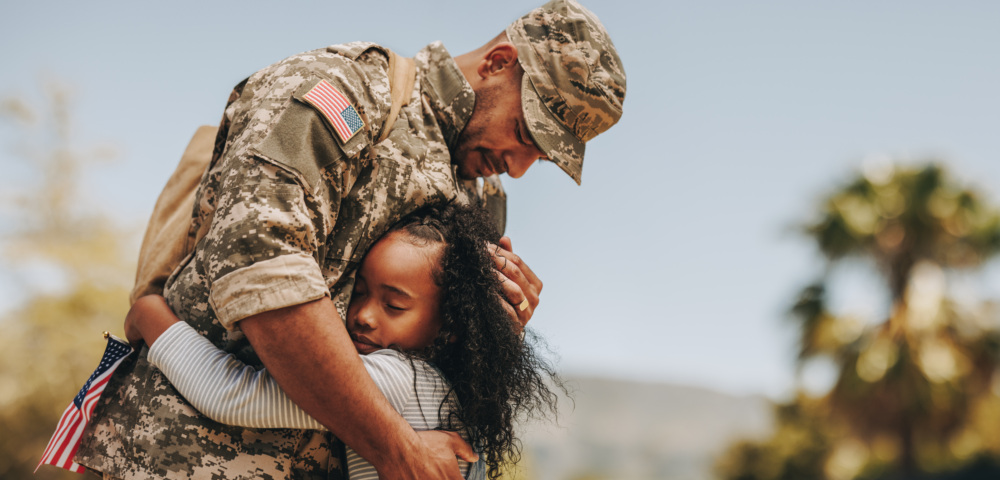

Public Sector Solutions, Workforce & Economic Mobility, Health, Results-Based Funding
Key Takeaway
Despite the challenges of Covid-19, the Individual Placement and Support teams pushed forward to deliver exceptional outcomes, including helping veterans better manage their PTSD symptoms. In all, Veterans CARE achieved employment outcomes that met or exceeded expectations based on randomized control trial results from comparable initiatives.
On November 11th of every year, for the last 100 years, we’ve commemorated the generations of Americans who have sacrificed their bodies and minds to serve in the U.S. armed forces. But only in the last decade or so, following successive wars in Afghanistan and Iraq, have we begun to genuinely grasp the seriousness of the sacrifice service members make—the visible and invisible wounds they might carry for a lifetime, long after they’ve transitioned back into civilian life.
In 2018, Social Finance collaborated with the Commonwealth of Massachusetts, the City of Boston, the New York City Department of Veteran Services, the Department of Veterans Affairs (VA), and the Tuscaloosa Research and Education Advancement Corporation to use outcomes-based financing to scale an evidence-based, supported employment intervention for veterans dealing with one of the most common invisible wounds of war today: post-traumatic stress disorder (PTSD).
The program, called Veterans Coordinated Approach to Recovery and Employment (Veterans CARE), served 312 veterans with service-connected PTSD between June 2018 and September 2021.
The impact of PTSD on veterans
PTSD ranks among the most serious conditions modern veterans contend with. It’s a potentially disabling mental health condition that’s pervasive among veterans, especially those who served in the post-9/11 period. Of the 4.3 million veterans who receive benefits from the VA for service-connected disabilities, 20% get support for PTSD.
The symptoms of PTSD can be debilitating and therefore negatively impact a veteran’s ability to gain steady employment, a key indicator for successful reintegration. VA data indicates that half of post-9/11 veterans enter a period of unemployment post discharge, and that the average duration of this stretch of unemployment is on the rise. Without intervention, this worrying trend could accelerate further, putting more veterans at risk for adverse life outcomes while also overwhelming already strained service member support infrastructure at the VA and elsewhere.
Scaling evidence-based supportive employment for veterans
Veterans CARE embedded Individual Placement and Support (IPS) services at four VA medical centers in New York and Massachusetts. IPS prioritizes rapid job search for employment opportunities that match an individual’s needs, talents, and preferences, along with integrated mental health care and ongoing support for as long as participants need help managing symptoms.
The evidence for IPS is well established. Almost two dozen randomized controlled trials (RCTs) across multiple countries, diagnoses, and contexts show that IPS leads to robust and consistent improvements in employment outcomes for veterans. These outcomes include an increased likelihood of obtaining a competitive job, maintaining full-time employment, making steady workplace contributions, and earning more income. IPS has also been shown to improve veterans’ lives outside of work, helping them develop and sustain positive interpersonal relationships and daily routines that improve their overall quality of life.
Strong outcomes despite Covid-19 challenges
When the Covid-19 pandemic unfolded in March 2020, Veterans CARE IPS teams shifted all services to remote delivery via video conferencing. And to address the heightened level of distress of veterans in the program related directly to the pandemic, the teams began providing additional support to participants and their families, including food and medication deliveries and emergency assistance referrals. IPS teams also had to adjust to a historically difficult labor market: IPS teams began customizing job searches based on veterans’ COVID-19 risk tolerance. Exemplifying this shift, IPS teams helped a veteran find a job managing an outdoor drive-in movie theater due to their discomfort working indoors, in-person during the pandemic.
“The whole program changed after Covid-19,” one IPS specialist said. “It shifted from just finding jobs for veterans to developing more life skills. The team was doing work that psychologists and social workers should have done. Veterans were interacting more with IPS specialists than social workers.”
Despite these challenges, the IPS teams pushed forward to deliver exceptional outcomes, including helping veterans better manage their PTSD symptoms. In all, Veterans CARE achieved employment outcomes that met or exceeded expectations based on RCT results from comparable initiatives.
- Positive employment gains: Participants obtained employment across a diverse range of industries, including banking, federal and state government, security, health care, social services, and education. Veterans in the program went on to roles at the White House, Major League Baseball, and the Memorial Sloan Kettering Cancer center, among others. One participant even secured an acting role in a primetime TV show.
- Improved PTSD symptom management: Veterans’ PTSD ratings were assessed periodically over 18 months, with 46% of participants indicating that their symptoms had stabilized or decreased while enrolled in the program.
Project achievements drive expanded access to IPS for veterans in Massachusetts
IPS can work for all veterans, including those managing conditions outside of PTSD. The Commonwealth of Massachusetts has funded a 15-month extension of Veterans CARE program with expanded eligibility criteria to reach veterans 18 and older with PTSD or military sexual trauma (MST), regardless of whether the diagnosis is service-connected, who are unemployed, underemployed, or vulnerably employed. The extension, which launched in October 2021, will also continue to provide IPS support to veterans with PTSD at existing Massachusetts sites.
Veterans CARE and the subsequent expansion would not have been possible without steadfast commitment from our partners. We’re proud to help veterans attain competitive and compatible employment that supports their recovery and reintegration.
Learn more about our Public Sector Solutions →
Related Insight

Veterans CARE Project Summary
Following sustained, strong veteran employment outcomes throughout this period, the Commonwealth of Massachusetts funded a 15-month extension of Veterans CARE beginning in October 2021 and continuing through at least December 2022.